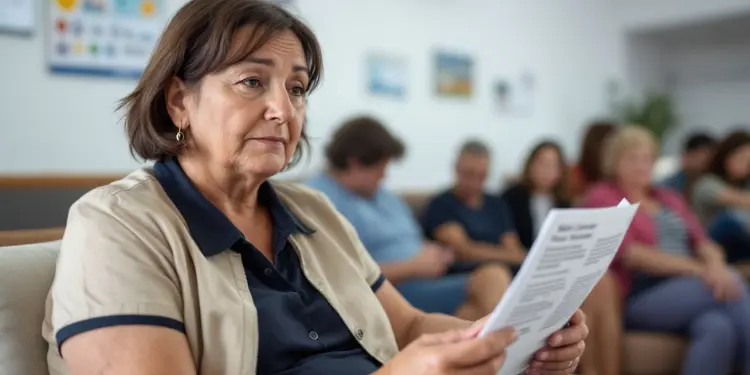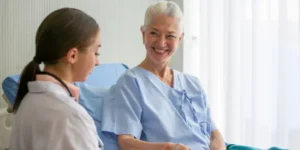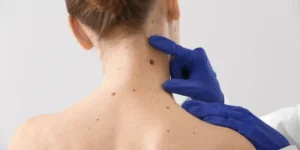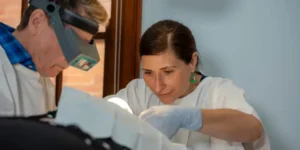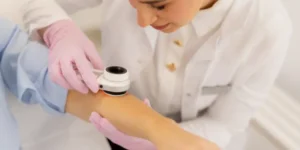Living in sunny Brisbane exposes you to high levels of ultraviolet rays. Australia records some of the highest skin cancer rates in the world. This blog explains why regular skin cancer checks at a Brisbane skin cancer clinic can save your life.
Early detection matters. A prompt check can spot small changes that you might miss on your own. Research from the Australian Cancer Council (2023) shows that skin cancer treatment works best when cancer is caught early.
Importance of Regular Skin Cancer Check-ups

Regular skin cancer checks can save your life. In Brisbane’s warm climate, your skin absorbs ultraviolet rays every day. Many skin cancers grow slowly and do not hurt, so they may hide from your notice. A visit to a skin cancer clinic lets experienced doctors catch early signs with trusted tools.
Most skin cancers have about a 90% cure rate when found early, but this chance drops if treatment is delayed. It is wise for most adults to have a skin check once a year, or more often if you have light skin, past sunburns, a family history, or a lot of moles.
Doctors carefully check spots on the scalp, back, and even between your toes.
Common Skin Cancer Types in Brisbane
Brisbane’s bright weather places locals at risk for several skin cancers. Basal Cell Carcinoma (BCC) appears as a small, shiny bump or a pink, scaly patch and grows slowly. Squamous Cell Carcinoma (SCC) shows as a rough, scaly growth that may bleed and can spread if left untreated.
Melanoma is the most serious type and often starts in moles that change shape, size, or colour. Actinic keratoses (ak) appear as rough, scaly patches that are not yet cancer but may develop into SCC if not watched.
Services Offered at Brisbane Skin Cancer Clinics
Our Brisbane skin cancer clinic delivers comprehensive care in a single, convenient spot. Situated centrally in Woolloongabba at 61 Ipswich Rd, our purpose-built facility focuses on the detection, diagnosis, and treatment of skin cancer and melanomas.
At the Skin Cancer Hub, experienced skin cancer doctors and trained staff work together with clinical excellence. We offer a range of services under one roof, and you do not need a referral to get started.
- Full body skin checks that spot odd areas before they become problems.
- Digital skin monitoring that captures clear photos of your moles to track changes over time.
- Skin biopsies that remove a small piece of skin for microscope testing.
- Cryotherapy that freezes unwanted skin spots using liquid nitrogen.
- Skin cancer excisions to remove the cancer along with a margin of normal skin.
- Skin flaps and grafts to repair larger areas after removal procedures.
- Photodynamic therapy that uses light and a special cream to kill cancer cells without surgery.
- Topical creams that let you treat certain skin cancers or pre-cancers at home.
- Light-based treatments that use focused beams to remove specific skin spots.
- Medicare rebates that help lower the cost of skin cancer checks and treatments.
- You do not need a doctor referral for a skin check at our clinic.
- Expert skin cancer doctors with extra training care for every patient.
- Same-day treatment is available if any problems are found during your check.
- Follow-up care plans to keep track of your skin health after treatment.
Benefits of Early Detection and Treatment
Spotting skin cancer early can have a huge impact. A quick check helps doctors see small changes before they develop into a bigger issue. Early treatment may mean less cutting, lower pain levels, and smaller scars. Facts show that most skin cancers are easier to treat when caught early.
Advanced Technology Used in Skin Cancer Detection
Modern technology has made skin cancer detection clearer and faster. Clinics now use digital dermoscopy to capture sharp, close-up images of moles.
How to Prepare for a Skin Cancer Check-up
Getting ready for your skin check is simple but very important. Remove makeup, nail polish, and secure your hair in a loose style so the doctor can see every area of your skin. Wear comfortable clothes that are easy to remove.
Write down any spots that worry you so you can share them with your doctor.
Tips for a Full Body Skin Check
- Wear loose, comfortable clothes you can easily take off to allow a full check.
- Remove all makeup before your appointment, as cosmetics can hide spots.
- Take off jewellery and watches so that your skin is fully visible.
- Know your skin by noting any changes and sharing them with your doctor.
- Take photos of any spots that worry you to track changes over time.
- Avoid fake tans for at least one week, because they can mask skin changes.
- Remove nail polish from your fingers and toes so the skin can be seen clearly.
- Write down any family history of skin cancer to help assess your risk.
- Be ready for a check that covers every area from head to toe.
- Ask questions about any spots that look odd; your input is important.
- Set aside enough time for a thorough check, as rushed exams can miss details.
- Plan to have skin checks yearly if you are at risk, to catch any issues early.
Skin Cancer Removal Techniques in Brisbane
Brisbane skin cancer clinics offer several ways to remove skin cancers. Surgical treatment often involves excision, where the cancer and some surrounding normal skin are removed. The area is numbed first so you feel little to no pain.
For small or surface-level cancers, doctors may use cryotherapy to freeze them, use curettage to gently scrape them off, or apply electrodesiccation to carefully destroy the abnormal cells. These methods usually leave less scarring than larger surgeries.
Photodynamic therapy uses light to kill cancer cells after applying a special cream.
Choosing the Right Brisbane Skin Cancer Clinic
Selecting a clinic with expert skin cancer doctors and top-notch equipment is very important. The Skin Cancer Hub at 61 Ipswich Rd, Woolloongabba stands out for its clear focus on skin cancer care. Our clinic is centrally located in Woolloongabba, Brisbane, Queensland.
We operate from a purpose-built facility dedicated to the detection, diagnosis, and treatment of skin cancer and melanomas. Our experienced doctors have extra training in both surgical and non-surgical treatments.
Frequently Asked Questions About Skin Cancer Check-ups
Many patients have questions about skin cancer check-ups at Brisbane clinics. These common concerns help clear up doubts and ease worries before your visit.
- How often should I get a skin cancer check-up? Most experts advise yearly checks. People with higher risks may need them every 3-6 months.
- Does a skin check hurt? No, skin checks are generally pain-free as the doctor uses gentle tools.
- How long does a full body skin check take? It typically takes about 15-30 minutes.
- Do I need to remove all my clothes? Yes, you should undress to your underwear so the doctor can examine as much skin as possible.
- What happens if a strange spot is found? The doctor may take a photo, use a dermoscope, or perform a biopsy to test the area.
- Are skin cancer checks covered by Medicare? Yes, many skin cancer checks come with a Medicare rebate.
- Should I check my own skin between doctor visits? Yes, a monthly self-check can help catch changes early.
- What should I do to prepare for my skin check? Remove makeup, nail polish, or fake tan as they can hide spots.
- Can teens and kids get skin cancer too? Yes, young people with fair skin or many moles should also have regular checks.
- What types of skin cancer are most common in Brisbane? The main types include basal cell cancer, squamous cell cancer, and melanoma.
Conclusion
Regular skin checks can make a big difference. With high skin cancer rates in Australia, early detection is key. Skilled skin cancer doctors can catch problems early, leading to better outcomes and simpler treatments.
Make skin checks a regular part of your health routine and stay informed about your skin’s condition.

